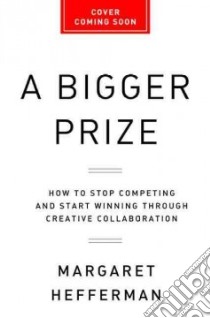A Bigger Prize - 9781610392914
Un libro in lingua di Margaret Heffernan edito da Public Affairs, 2014
- € 25.00
- Il prezzo è variabile in funzione del cambio della valuta d’origine
Competition has run amok. Social Darwinism, survival of the fittest, is crudely understood as justifying a winner-takes-all culture. If you want get into the best school, land the right job, buy the cool dress, find the perfect partner, be made for life, you have tread underfoot any and all your rivals. Competition has become a simplistic zero-sum game, played without any enjoyment at all.
In this book, Margaret Heffernan dispels this myth. Leading readers on a wide-ranging tour of competition across leading global organizations and industries, she exposes how desperately business, finance and education needs a curriculum that nurtures, develops and enlarges our collaborative talents.
There’s no denying that human beings are competitive, but we are not only competitive. Heffernan reveals how more often than not individual pursuit of self-interest proves to be collectively defeating and incurs high costs: When schools celebrate the top of the class, they demotivate the rest. When the rich win tax cuts, inequality grows. As sports become fiercer and richer, careers shorten and injuries abound. When executives are encouraged to compete for bonuses and promotions, it costs them friendships and creativity. When food producers aim to dominate their markets with low prices, it costs us all in environmental and social degradation. And when the pressure to win exacerbates cheating and corruption, it costs us the legitimacy of our institutions and our moral credibility. So how do we rein in competition, retaining its power to spur us on but denying it the destructive dimension that it acquires when it is made a uniquely canonical virtue?
In business, education, sports, and innovation, drawing from the long-time success stories of companies such as Ocean Spray, Gore, and Boston Scientific among others, Heffernan uncovers how social structures that reinforce interdependency produce excellent results and consistent leaders in their fields. These institutions create a truly collaborative ethos, which reinforces the sense of mission and purpose, and leads to self-motivated, driven individuals who none the less feel no need to claim their successes at the expense of their colleagues. Leaders of these companies have learned that collaboratively-arrived-at-solutions are far more durable and often simply better than those imposed by external authorities or managing agents. Most importantly, these organizations become robust, and able to survive the vicissitudes of political, social, and economic change.
In this book, Margaret Heffernan dispels this myth. Leading readers on a wide-ranging tour of competition across leading global organizations and industries, she exposes how desperately business, finance and education needs a curriculum that nurtures, develops and enlarges our collaborative talents.
There’s no denying that human beings are competitive, but we are not only competitive. Heffernan reveals how more often than not individual pursuit of self-interest proves to be collectively defeating and incurs high costs: When schools celebrate the top of the class, they demotivate the rest. When the rich win tax cuts, inequality grows. As sports become fiercer and richer, careers shorten and injuries abound. When executives are encouraged to compete for bonuses and promotions, it costs them friendships and creativity. When food producers aim to dominate their markets with low prices, it costs us all in environmental and social degradation. And when the pressure to win exacerbates cheating and corruption, it costs us the legitimacy of our institutions and our moral credibility. So how do we rein in competition, retaining its power to spur us on but denying it the destructive dimension that it acquires when it is made a uniquely canonical virtue?
In business, education, sports, and innovation, drawing from the long-time success stories of companies such as Ocean Spray, Gore, and Boston Scientific among others, Heffernan uncovers how social structures that reinforce interdependency produce excellent results and consistent leaders in their fields. These institutions create a truly collaborative ethos, which reinforces the sense of mission and purpose, and leads to self-motivated, driven individuals who none the less feel no need to claim their successes at the expense of their colleagues. Leaders of these companies have learned that collaboratively-arrived-at-solutions are far more durable and often simply better than those imposed by external authorities or managing agents. Most importantly, these organizations become robust, and able to survive the vicissitudes of political, social, and economic change.
Informazioni bibliografiche
- Titolo del Libro in lingua: A Bigger Prize
- Sottotitolo: How We Can Do Better Than the Competition
- Lingua: English
- Autore: Margaret Heffernan
- Editore: Public Affairs
- Collana: Public Affairs (Hardcover)
- Data di Pubblicazione: 08 Aprile '14
- Genere: BUSINESS and ECONOMICS
- Pagine: 391
- Dimensioni mm: 234 x 155 x 0
- EAN-13: 9781610392914


